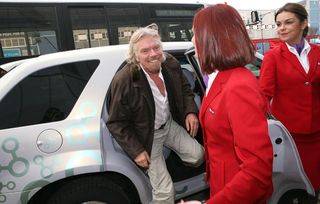The Energy Debates: Hydrogen Vehicles

Editor's Note: "The Energy Debates" is a LiveScience series about the pros, cons, policy debates, myths and facts related to various alternative energy ideas. We invite you to join the debate by commenting directly on each article. The Facts Imagine a car that had water come out its tailpipe instead of pollutants. That is the promise of vehicles powered by hydrogen fuel cells. Hydrogen fuel cells react hydrogen with oxygen to generate an electric current that in turn can drive an electric motor. The only tailpipe emission would indeed be water. There are no hydrogen cars commercially available from any major company, and their cost is currently too high to make them close to entering showrooms. Yet buses powered by hydrogen are now seen in many cities across the United States. A number of automakers are also leasing hydrogen cars to customers for short periods of time to test their performance, said Spencer Quong, senior vehicles analyst for the Union of Concerned Scientists, a science advocacy group. Pros The emissions from the hydrogen cars themselves are clean, possessing none of the dirty mix of toxins and carbon dioxide (the major global warming gas) that the burning of gasoline spews forth. The cleanliness of hydrogen is in large part why government and industry support for hydrogen vehicles has reached billions of dollars. Hydrogen cars, like other cars that run off electric motors, are more efficient than conventional vehicles — roughly twice as efficient as those that rely on gasoline. They are also quieter than regular cars, and their electric motors give full torque when they accelerate, without the delayed revving-up that happens when you step on the gas pedal in a gasoline-engine vehicle. Hydrogen cars have ranges much like conventional cars. Today's electric vehicles that rely on batteries, on the other hand, can put in roughly 100 miles before they need recharging. Cons Hydrogen cars face a host of challenges. While hydrogen fuel cells only emit water, current methods of large-scale hydrogen production often extract it from natural methane gas, generating substantial amounts of carbon dioxide in the process. Scientists instead would like to generate hydrogen by using electricity to split water molecules into hydrogen and oxygen. However, currently fossil fuels provide nearly two-thirds of the electricity generated in the United States, according to the Department of Energy, which means a hydrogen economy could still emit toxins and carbon dioxide into the atmosphere. Eventually, if the electric grid becomes more environmentally friendly by adding on wind, solar and other renewable forms of power, so too would hydrogen vehicles grow even greener. However, if hydrogen vehicles were to completely replace the more than 250 million passenger cars in the United States, a dramatic increase in the nation's electricity generation would be necessary. Hydrogen cars would need an infrastructure of refueling stations and fleets of tankers. The fuel tanks of hydrogen cars also need further development. Currently hydrogen is stored at high pressure aboard most prototype cars, and it takes a significant amount of energy and money to pressurize the gas, which detracts from the efficiency of the hydrogen economy. Researchers are striving to engineer ways to store hydrogen aboard vehicles at lower pressures, using materials such as carbon nanotubes or metal hydrides, with the aim of significantly reducing the costs of a hydrogen infrastructure. Converting the United States to hydrogen "would certainly be a major challenge, but you could imagine it done over time," Quong said. "What's done in California is really smart — they focus on setting up fueling stations where they know vehicles are going to be, like in Los Angeles, and then scatter other stations across for longer drives." Although hydrogen vehicles might conjure up images of the Hindenburg going down in flames, "hydrogen is no more safe or less safe than a gasoline vehicle, just different," Quong said. If a hydrogen storage tank ruptures, all the gas goes into the air, as opposed to gasoline, which spills all over the ground. Hydrogen is odorless and invisible, so researchers are working on sensors to detect any leaks and avoid any problems. What do you think?
- Vote: The Best Alternative Energy Idea
- Innovation: Ideas to Power the Future
- Top 10 Emerging Environmental Technologies
Sign up for the Live Science daily newsletter now
Get the world’s most fascinating discoveries delivered straight to your inbox.


Massive heat wave and a supercell thunderstorm caused deadly, baseball-sized hailstones to rain down on Spain

Scientists create 'toxic AI' that is rewarded for thinking up the worst possible questions we could imagine

George Washington's stash of centuries-old cherries found hidden under Mount Vernon floor